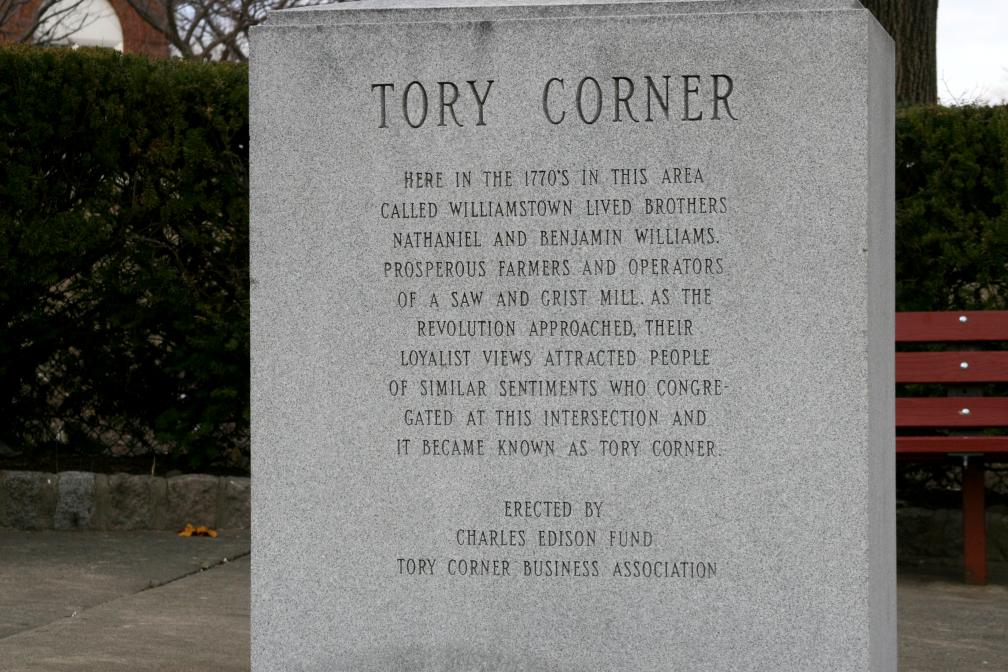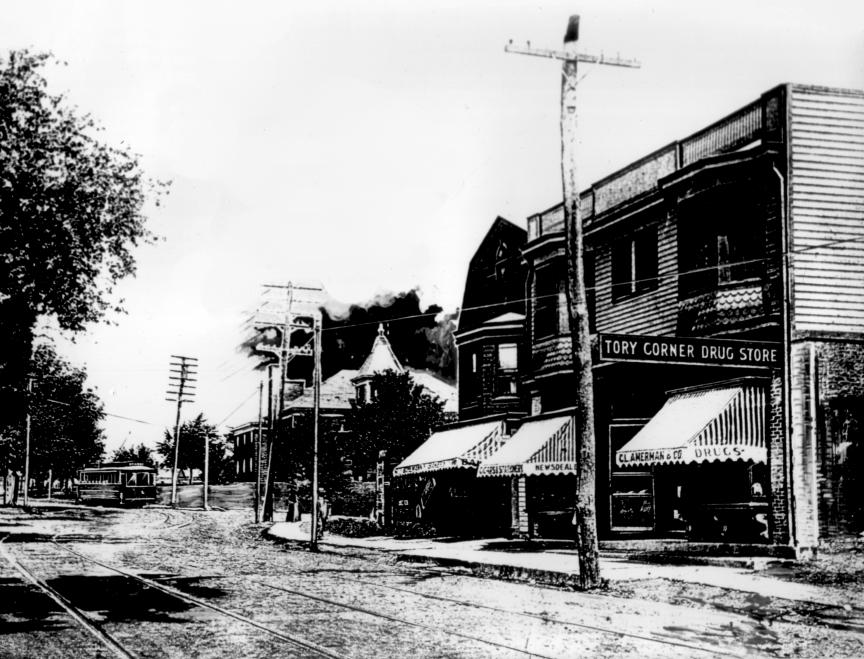

Photo by Frederick Goode, taken 3/16/08
TORY CORNER HERE IN THE 1770's IN THIS AREA CALLED WILLIAMSTOWN LIVED BROTHERS NATHANIEL AND BENJAMIN WILLIAMS, PROSPEROUS FARMERS AND OPERATORS OF A SAW AND GRIST MILL. AS THE REVOLUTION APPROACHED, THEIR LOYALIST VIEWS ATTRACTED PEOPLE OF SIMILAR SENTIMENTS WHO CONGRE- GATED AT THIS INTERSECTION AND IT BECAME KNOWN AS TORY CORNER ERECTED BY CHARLES EDISON FUND TORY CORNER BUSINESS ASSOCIATION |

This photo of Tory Corner
in West Orange, NJ was taken in 1890. It is from a collection of
photos in the archives of the First Presbyterian Church in Orange, NJ.
The name of Amos Williams appears in Newark town records as surveyor of highways in 1737-38; assessor in 1741-42. He died in 1754, aged sixty-four years. His children were Nathaniel, 1733; Benjamin, 1740; and Sarah, second wife of Joseph Dodd, born in 1742. Enos, James and another Sarah died young.Nathaniel married Sarah Pierson, and lived in the old homestead. He learned the cooper's trade of his father who desired him in his will to instruct his brother Benjamin, then fourteen years of age, in the same trade, which he did. Township records say he was overseer of highways in 1756. His children were Zenas, Amos, James, John, Uzal and Nathaniel.After Benjamin became of age he took, by his father's will the upper part of the farm, then a wilderness, and commenced clearing and building a home. The brothers built a dam and erected a saw-mill on Wigwam Brook about 1760 or '70. Benjamin married, first, Elizabeth Condit, who soon died, leaving a daughter Elizabeth. He then married Phebe, daughter of Caleb Crane, Esq.When the Revolutionary war broke out in 1776, the brothers, together with their uncle, James Nutman, took the unpopular English side. James Nutman was imprisoned in Morristown and Sussex County jails by the Committee of Safety. Nathaniel went to New York. His wife petitioned the Committee of Safety not to be sent to her husband, but asked to be allowed to remain with her children at home. Nathaniel died there in 1782, of smallpox. His property was confiscated but as his action was the result of an honest opinion, there was no personal ill-will against him by his former neighbors, but rather sympathy for his family and at the sale no one would bid against the widow.Benjamin took out a written protection from a British officer, which, owing to the situation of the opposing armies, could have been of but little value. At the last moment by law allowed he was induced by his father-in-law to take the oath of allegiance to the new government and save his property, but he never surrendered his convictions. He always said that "the Declaration of Independence was as big a lie as was ever written" and would never accept an office under the new government, although prominent as a business man.After the War of the Revolution Benjamin acquired considerable real estate, started a tan-yard, built a bark mill, carding mill, distillery, currying-shop and cider mill. |